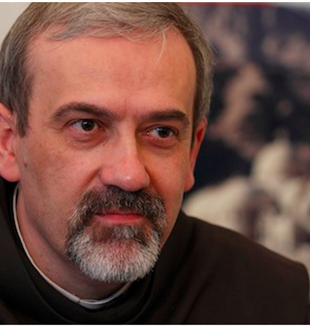
Witness of the Franciscan Superior of the Holy Land
The 16th annual gathering was entitled For Freedom Set Free. Fr. Pierbattista Pizzaballa, Custos of the Holy Land was among the invited speakers and addressed the timely topic “Christians in the Middle East: What future, what hope?”The University of Notre Dame Center for Ethics and Culture brought together renown scholars to grapple with questions of ethics, culture and public policy at its fall conference. The 16th annual gathering, which took place November 19-21, was entitled For Freedom Set Free. Fr. Pierbattista Pizzaballa, Custos of the Holy Land was among the invited speakers and addressed the timely topic “Christians in the Middle East: What future, what hope?” Earlier in the week, Fr. Pizzaballa spoke at Crossroads Cultural Center in Washington DC and on two other college campuses: Catholic University of America in DC and DePaul in Chicago, the latter events sponsored by Communion and Liberation University Students.
With 25 years of experience as the superior of the Franciscans in the Middle East, Fr. Pizzaballa spoke of the religious identity of the Jewish, Muslim and Christian peoples he has lived and worked with in Israel, Syria, Lebanon, Jordan, and Egypt. He spoke of the “proxy war” being fought in the Middle East and how it has affected each country. In Aleppo, for example, the second largest city in Syria, there is no water or electricity, which also means no normal services like banks or courts or public schools. He spoke also of the signs of hope and charity resulting from this tragedy: vans leave from his parish daily to take water from the monastery well to the poor and elderly; young people take to the streets to deliver food to the hungry; the faithful travel long miles anxious to celebrate the mass. He recounted the witness of two priests who, after being kidnapped and released months later, were given the option to be sent elsewhere. Both replied that as long as they had one parishioner to care for, they would stay in Syria.
He spoke of the refugee camps in Lebanon and Turkey, 99% of which are filled with Muslim families. “The question today is integration,” he said, “We do not have a ‘clash of civilizations’ in the Middle East. but the destruction of civilizations.” He pointed out that the concern, therefore, should be on rebuilding. He noted that after this current crisis, there will still be Muslims, Christians, Jews and other minorities in the Middle East, so it comes down to this: with whom can we rebuild and how will we together respond to the modern questions of freedom of conscience, freedom of education, the role of women and men, etc. Inter-religious dialogue must go beyond agreeing on the belief in one God to deal openly with these important issues.
Though there was much discussion toward the end of the session about personal dialogue vs. interfaith dialogue, especially among Muslims, he noted, “I refuse to believe that I, as a Christian, cannot be in relationship with at least some of them.”
If you would like to hear Fr. Pizzaballa, he will be present at the New York Encounter, speaking along with Archbishop Nona, the Iraqi Archbishop of Mosul in exile, Sunday, January 17th 2016 at 4pm. For more information about New York Encounter visit: http://www.newyorkencounter.org/#MiddleEast